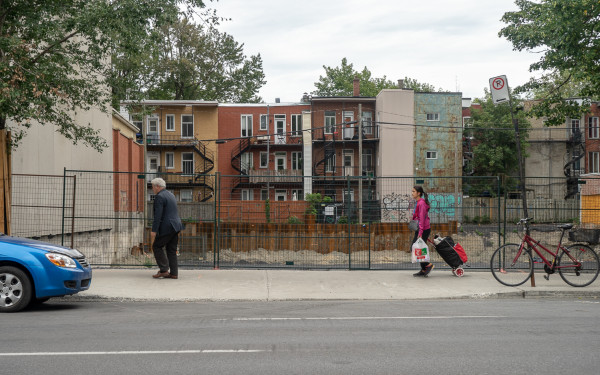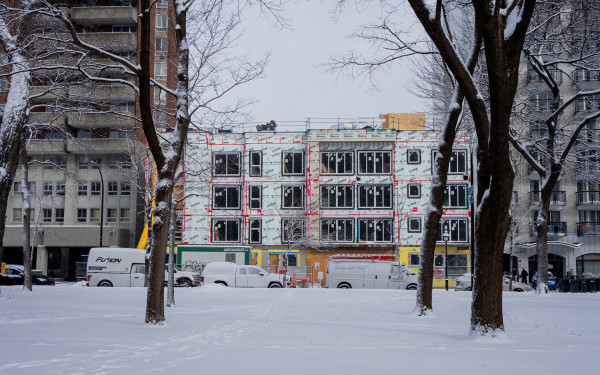Residence Students at the Forefront of the Housing Crisis
Concordians Paying Unsustainable Rents in Residences
From the outside, the Evo at 777 Blvd Robert-Bourassa seems to be nothing more than a 108-metre-tall building from the 70s with brutalist architectural lines.
However, behind the facade of greyish concrete, steel and glass panels, the former Delta Centre-Ville hotel is an island of luxury in the heart of Montreal’s International District.
“It is luxurious,” admitted Shauna Shanbhag, a Concordia international student from India, sitting in the lobby’s comfortable red chairs. She can afford the Evo way of life because she works as a resident assistant for 20 hours per week. Her otherwise unsustainable rent is deducted from her paycheck.
Only a handful of Concordia residents receive this opportunity. Since August 2022, Concordia University has privatized two Evo floors for its community. A shared living arrangement in a building with a private gym, a pool with a view of Montreal’s skyline, and corridors full of paintings costs tenants $990 per month.
Even Concordia’s cheapest dorms, located at Hingston Hall on the Loyola campus, are not affordable for most occupants. The lowest rate, a shared room with two double beds and a sink is $553.19 monthly, accompanied by a mandatory meal plan of $2,675 for each semester.
The university denies the problem and has continued promoting its Mildoré and Evo accommodations. Nevertheless, many students are getting involved in reimagining student-based solutions to the crisis.
When Shanbhag arrived in Montreal in the winter of 2022, the Grey Nuns residence became her first home. “It was nice to have this adjustment period instead of just landing and then moving to an apartment and starting to live independently for the first time,” she recalled.
However, Shanbhag soon started a quest for a more affordable and convenient place to live. “When I first applied to live at Grey Nuns, that was one thing holding me back,” she remembered. Meanwhile, she had asked to become a resident assistant at EVO, hoping she could remain there for a lower price.
Shanbhag organizes social events, looks over residents and keeps a walkie-talkie at all times in case of emergency. In exchange, she receives a 90 per cent discount on rent. Shanbhag will have to re-apply for this living arrangement at the end of the winter term. If she cannot obtain this position again, she will have no option but to leave.
Housing is affordable as long as the cost of rent does not represent more than 30 per cent of a tenant's monthly income, according to the Canada Mortgage and Housing Corporation. Figures show that Concordia's cheapest shared dorm room on the Loyola Campus does not satisfy this criterion for most students, even for those earning $20,000 yearly.
Lauren Farley, the director of Concordia Residence Life, acknowledged that the Evo is more expensive than others. In addition, she claimed that the margin between what the university charges tenants and the rent they pay to the third-party provider is insignificant.
“Residence life is not necessarily for everyone,” Farley justified. To her, Concordia residences are more than simple rooms. They instead foster a feeling of community and are an “added value,” allowing undergraduates to integrate. “I feel very proud of the program we do and how much effort we put into making it accessible but also desirable to students,” Farley emphasized.
Knowing that dorms are traditionally the cheapest option, their lack of affordability represents a paradigm shift; student housing has become a market opportunity for multinational companies in Montreal, like Evo’s owner, N-DCV Holdings. Its main shareholder traces back to a mailbox on the island of Jersey, long considered one of the world's worst tax-havens.
As Concordia’s facilities at Grey Nuns are aging, the university claims third-party agreements with Evo, and perhaps other providers in the future, are inevitable to honour the guaranteed housing promises made to first-year students from outside Quebec.
According to Farley, Grey Nuns currently lacks 250 beds because of renovations on the west side of the building. After a tough time during the COVID-19 pandemic, students are back in their residences. Farley said the occupancy rate is around 90 per cent for the 2022-2023 academic year.
The Evo is not the university’s only public-private partnership. It firmed its first agreement with the YWCA three years ago.
“I find [the Evo partnership] ridiculous, knowing that Concordia’s residences are already costly,” Karine Balé said. She arrived from Togo and lived at the Evo from September 2018 to April 2019. While the university had not set the private partnership at the time, room prices were almost as high.
Before leaving her home country, Balé searched the internet for accommodations, and Evo’s website appeared among the first. “I was reassured by the fact that there were videos and comments. Other residences seemed sketchier,” Balé recalled.
The Woodnote Cooperative, a four-floor apartment building which opened its doors in 2020, is located at the corner of Papineau Avenue and Sherbrooke Street. The Concordia Student Union funded the project in partnership with UTILE, a non-profit organization specialized in student housing.
Prices start at $752 for a studio, which is 30 per cent cheaper than the local market. The rents can only increase by a maximum of 2 per cent yearly to reflect the impact of inflation on the building’s operational costs.
Four years later, Balé does not regret her decision to move out. She gained more privacy and saved money at the Woodnote. Luckily, her family supported her financially, unlike three-quarters of students who do not receive any aid to pay their rent, according to a UTILE 2021 report.
The lack of affordable beds in residences impacts the conventional market, according to Cédric Dussault, spokesman for the (Le Regroupement des comités logement et associations) RCLALQ, a social housing advocacy group. “Students are both victims and aggravating factors of the housing crisis,” he stressed. While they are poorer than the general population, their compound income is sometimes higher when they live with roommates, allowing them to rent family houses that are scarce in parts of Montreal.
Dussault thinks the provincial government has neglected student residence funding for too long to the detriment of the entire population. However, Concordia Residence Life cannot legally receive subsidies from Quebec because it is considered a revenue-generating department.
It is unsure whether more money would improve the situation. Farley is open to the idea, although she denied that Concordia has a role to play in making housing more affordable. “Maybe as a very large institution in Montreal, we have a responsibility to have that conversation, but is it our responsibility specifically? That is difficult to say,” she said.
Balé, who studies economics, thinks that subsidies are useless if universities do not entirely rethink their housing system and business model.
“There would be more gains doing more interesting partnerships with non-profits or organizations interested in students’ wellbeing,'' she said.
As one of Woodnote’s provisional board members, Balé saw this affordable housing project evolve before her eyes. It became a 144-room hive designed to nurture a spirit of solidarity among neighbours, who can gather on a central wooden patio or inside a cozy communal room to watch movies.
Proximity to the university, reasonable rent, safety, and opportunities to gather and feel part of a community are four key elements housing must meet, according to Balé.
Thanks to her past involvement as a treasurer and a representative at UTILE’s board, Balé has become synonymous with Woodnote to many members, garnering the nickname “the co-op girl.”
Balé hopes the Woodnote will lead the way towards a different housing future that will answer students’ needs and include all stakeholders around the negotiation table–not only promoters. “Everything is possible,” said Balé. “Let’s open the pandora’s box.”
This article originally appeared in Volume 43, Issue 10, published January 24, 2023.




_600_375_90_s_c1.jpg)

